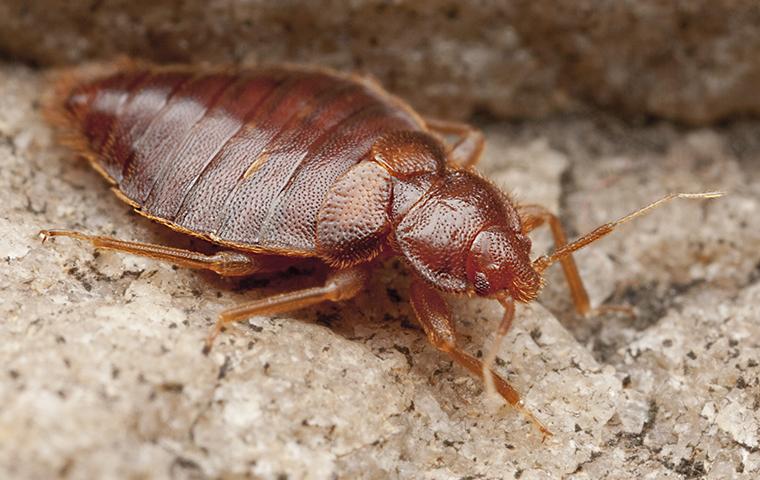They're creepy, they're crawly, and they're sneaky pests. They come out at night to bite, they grow large populations, and their sleeping habitats are more than a bit gross. We're talking about bed bugs. You don't want them in your house, and we want to give you the facts you need to keep them out. Today, we'll share with you proven methods of control: how to detect bed bugs, how to stop them from getting into your home, and what to do if you already have an infestation. If you want professional assistance with bed bug pest control in St. Charles, we can help with that as well. Call us to speak with us about your problem or to request service. We're here to help you find answers to your bed bug questions.

What Are Bed Bugs?
First of all, if you've been hiding under a rock (or under a mattress), let's start by discussing what exactly is a bed bug. There are a few bed bug characteristics that provide insights into what works to control bed bugs in St. Charles—and what doesn't.
- Bed bugs are insects. They have six legs, three body parts, and two antennae. In your home, you can expect them to do what other insects do. They will search for food and grow a population.
- Bed bugs feed on blood. While some insects can't survive in your home for long because it lacks the unique foods they need for survival, bed bugs have no such limitation. They thrive in homes. Blood is a rich food source that can sustain these insects for weeks between meals if needed.
- Bed bugs are indoor insects. If you have exterior perimeter pest control, it will not keep these bugs out, so don't be too hard on your pest control service provider if you get bed bugs. As indoor insects, repellents don't work well on them.
- Bed bugs won't prefer to live outside if you apply repellents. They'll simply avoid them or go right through them when they are too hungry to avoid them any longer.
- Bed bugs don't choose where they live. Most of the time, they move passively from one location to another. Therefore, there isn't anything you can alter in your home to prevent an infestation. These insects are found in the cleanest and most well-kept homes.
- Bed bugs are persistent pests. For this reason, natural pest control for bed bugs is not recommended. Treatments of appropriate materials administered according to strict protocols are needed for the best results.
Bed bug control is a complicated process. The best solution is not to get bed bugs in the first place. Let's take a look at bed bug prevention, starting with how to detect bed bugs when you're away from home.
Bed Bug Bites Are Usually The First Sign Of A Problem
Imagine going on vacation and waking up with the intention of going down to the beach, but you notice red, rashy welts on your body. That is a horrifying scenario that far too many people have experienced. Bed bug bites are an easy first sign that you are staying somewhere that has bed bugs. But it isn't the best sign, is it? When you see welts all over your skin, your vacation is on its way to being ruined. It is better to catch those bugs before they bite.
What are the early signs of bed bugs in your room?
- Bugs. If you check between your mattress and box spring, drag along seams, and look under upholstered seat cushions, you may see bed bugs. They are seed-shaped, six-legged pests that may appear red, white, tan, or rusty brown. An unfed bed bug may have black coloration in its body. That is fecal matter. Look closely for bed bugs. They are between 1/26 and 1/5 of in inch long. Newly hatched bugs are nothing more than specks.
- Stains. If you notice black stains, brown stains, or a mix, you may have a bed bug problem. Bed bugs leave these stains on pillowcases, bedspreads, sheets, curtains, carpets, and upholstery. You may also find these stains when you search for the bugs in your room. The black stains are caused by fecal spotting. The brown stains are dried blood.
- Skins. If you see tiny insect skins in creases, cracks, or tight spaces, you may have bed bugs. Shed skins often look like the bugs that shed them. Bed bugs shed their skins whole during the nymphal stage. Since nymphs are white, yellowish, or tan, their shed skins are as well.
- Eggs. If you see tiny eggs that look like they could balance on a pen tip, they're likely bed bug eggs. A bed bug egg is 1/26 of an inch long and oval shaped.
- Smells. If you smell something that is sweet like berries, but a bit musty, you may be smelling bed bugs. The scent of bed bugs is also described as smelling like coriander or cilantro.
When you detect bed bugs in your room, take steps to stop those insects from hitching a ride home with you. Doing so can help you avoid having to call local pest control for bed bugs when these insects infest your home.
- Change clothes and store laundry items in a sealed plastic bag.
- Move to another room that is not adjacent, above, or below the infested room.
- Always store all laundry items in a sealed plastic bag.
- Keep watch to see if bed bugs have gotten into your luggage.
- When you return home, keep your bags outside.
- Wash all laundry items in hot soapy water and run them through at least a thirty-minute dryer cycle to eliminate bed bugs.
- Examine your luggage, checking every tight space, crease, crack, and pocket. If bugs are found, consider contacting a licensed professional to treat the item. Bed bugs can survive months without a blood meal. If you have a freezer and the item can fit in it, you can freeze it for four days to eliminate the bugs.
Bed bug infestations often happen after vacations and holidays, when people travel and stay in accommodations. But bed bugs can enter your home in many ways. Let's quickly look at some of the unique ways they can invade your space.
How Bed Bugs Find Their Way Into Our Homes
Okay. Apart from vacations and holidays, how do you get bed bugs? There are a surprising number of ways these insects can find their way into your home. Here are just a few of them.
- You can get bed bugs when you go to work. They're found in a wide range of businesses. Bed bugs can transfer from item to item, even during the day.
- You can get bed bugs when you travel in a cab or on a bus.
- Your kids can get bed bugs at daycare, school, or during a sleepover at a friend's house.
- You can get bed bugs when you visit a loved one in assisted living.
- You can get bed bugs when someone comes over to your home. Bed bug infestations can go weeks without detection.
- Your college-age kids can bring bed bugs home from their dormitory or lodging.
- You may get bed bugs from your walls. Bed bugs can get into walls and pass from one housing unit to another.
That last one makes bed bug control in St. Charles tricky. If you're in an apartment, multi-family home, or similar housing arrangement, you are at risk of a bed bug infestation. That is the sad reality.
If bed bugs find their way into your home, what can you do? What are the proven methods for bed bug control? Let's take a look.
The Best Bed Bug Control Method For St. Charles Homes
A bed bug treatment is multi-faceted. Some aspects of control are simple to understand. Others are made complicated by these resilient and elusive pests. The methods that work to control bed bugs must account for the clever ways bed bugs avoid extermination.
Inspection: Step one is a detailed evaluation of the infested area. Many factors are considered.
Checklist: The home will need preparation before the treatment is applied. Preparing your home helps the technician get to the required areas and prevent bed bugs from finding hiding spots.
Treatment: A systematic application of control materials work to arrest bed bug activity and establish residual control for any bugs that emerge from eggs.
Evaluation: A detailed inspection is needed to check success and consider additional applications.
When these steps are properly executed, bed bugs aren't given the opportunity to outsmart the treatment. Proper selection of materials and trained application are needed for efficacy. We highly recommend having a licensed applicator handle bed bug control.
If you're in St. Charles, contact Pest Control Consultants for industry-leading bed bug control. We can treat single rooms, whole structures, and single units. Our technicians have the training and experience to get this difficult job done right. Best of all, we offer same day service. You don't have to wait and let bed bugs torment you one day longer. Get help. Give us a call.
 Customer Reviews
Customer Reviews
